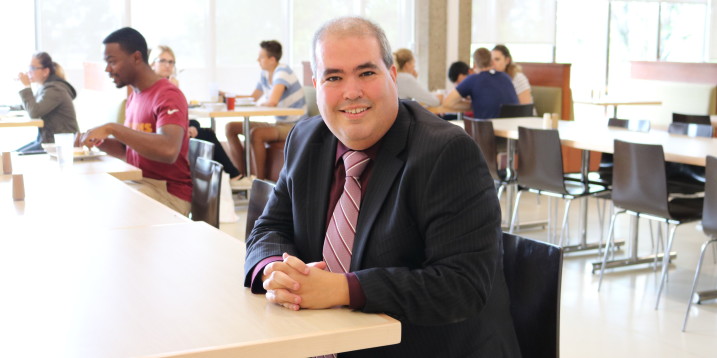By Kayla Perry, Editor-in-Chief
Although it’s been nearly five months since the Ontario government denied Laurentian University’s proposal for a stand-alone LU campus in Barrie, Dominic Giroux is still passionately working to make the stand-alone campus a reality.
Giroux, Laurentian University President and Vice-Chancellor, said there is “no doubt in (his) mind” that there will, eventually, be a stand-alone campus in Barrie.
“It is the twentieth largest census metropolitan area in the country, it is the urban growth center of Simcoe County, which is a growing region in itself. It is a region and a city that is significantly underserved. So it’s not a matter of ‘if’, it’s a matter of ‘when.'”
The beginning
For those who are unfamiliar with the decision, in Dec. 2013, the Ontario government issued a call for proposals for new university campuses across Ontario. Ultimately, 13 university proposals were submitted. On May 20, the Ministry of Colleges and Universities announced it’s decision to support and co-finance a York University campus in Markham.
Although Laurentian University classes are currently offered through a partnership with the Georgian College campus in Barrie, Laurentian had hoped to create it’s own, stand-alone campus, which would reside in 64-acres of vacant land on Essa Road: the proposed campus would include residence space to house up to 750 students, a student centre, and facilities for athletics and recreation. Proposed courses would have included Science, Engineering, and Architecture, as well as Arts and Health.
Next steps
While Barrie may be as under-served as Giroux stated, it has become increasingly difficult for Laurentian to spawn growth in Barrie without the government’s support: since 2010, the government of Ontario has prevented the Laurentian Board of Governors from making decisions regarding the location of programs at the Barrie campus independently. According to Giroux, if Laurentian leaves the Georgian College campus in Barrie, the government would cease to fund Laurentian’s academic endeavors in Barrie.
“To my knowledge, we’re the only institution in this position, where the government interferes to that extent,” said Giroux.
Furthermore, since 2011, the government has placed a cap on the amount of programs which Laurentian can teach at the Barrie campus.
Giroux noted that Laurentian is appealing the government’s decision to have approval rights over any and all Laurentian movement and growth in Barrie.
“Since the government’s decision in May, we’ve been asking the government to restore the (Laurentian) Board of Governors and Senate’s ability to make the best decisions, moving forward, for the students…To my knowledge, we’re the only institution in this position, where the government interferes to that extent. We’re not asking for anything different, in terms of normal processes, than any other university.”
Missing information
Upon denial of Laurentian’s proposal, the Ministry offered to debrief the university on the strengths and weaknesses of their proposal — however, Giroux described a “technical debrief” in which little information was revealed.
“To the Ministry’s credit, it was quite a comprehensive technical debrief… However, the ranking of the (thirteen) submissions has still not been disclosed, the funding requested by York University, which was the successful bidder, was not disclosed, nor the government’s financial commitment for the new campus. To me, these are three big question marks left.”
Giroux noted that the weaknesses in Laurentian’s proposal which were identified included financial strength of the university (pointing to the size of Laurentian and it’s assets), and the population growth in the proposed location.
The President also expressed his opinion that the Ministry took a “very narrow view” of the definition of population demand: “their criteria they’ve chosen to apply is to determine whether there will be an increase in the university-aged population in the foreseeable future…. By applying that lens, it doesn’t reflect the fact that some cities like Barrie are underserved.”
The absence of a college collaboration also negatively affected the proposal.
Barrie students disappointed
While Giroux and members of the administration continue to encourage dialogue with the provincial government aimed at regaining control of the Laurentian Board of Governor’s decisions and Barrie expansion, some students at the Barrie campus are taking matters into their own hands.
Jeremey Ross, President of the Laurentian Student Union (LSU) — the Barrie campus’s student association — said that the government’s decision was a “big disappointment.”
Ross was elected in March 2015, and said that the prospect of a stand-alone LU campus in Barrie makes sense for students in Barrie economically and socially.
“It’s pretty much all we’ve heard about. I actually completed my first year in Sudbury and then transferred down (to Barrie), and once I got here, (the stand-alone campus) was kind of the big talk of Barrie: that we would get our own campus in 2018 or 2019, and that for the most part, the province is on our side.”
Ross notes that the LSU was a large supporter of the proposal — the 2014-15 LSU President (name unknown) had actually gathered a letter of support for the Barrie campus, signed by every Laurentian University student association, which was then handed to Kathleen Wynne at Laurentian’s model parliament event in Ottawa.
“It’s been hard for the LSU to engage our students, because we do not have a stand-alone building, let alone a stand-alone university (campus.) It’s very hard for (members of the LSU) to get to know Laurentian students, because they’re mingled in with the Georgian students on campus. When the decision came down, I was not happy,” said Ross.
“It didn’t make sense logistically, economically, or financially… It was a big blow, but that doesn’t mean the fight is over.”
-Photo by Kayla Perry
